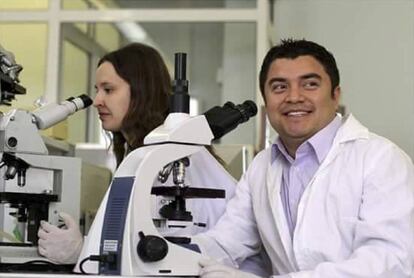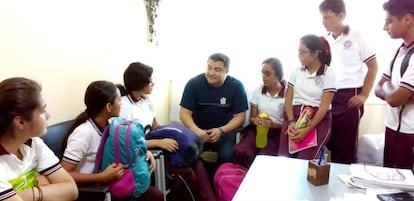Mexican scientist Héctor Alejandro Cabrera Fuentes pleads guilty to spying in the US
The researcher, who is accused of collaborating with Russia’s Foreign Intelligence Service, has reached an agreement with the public prosecutor to avoid trial in a bid for a reduced sentence

The story of Héctor Alejandro Cabrera Fuentes has taken another twist. The Mexican scientist, who is accused of spying in the US on behalf of Russia’s Foreign Intelligence Service, has reached an agreement with the public prosecutor and pleaded guilty to the charges at a hearing held on Tuesday in Miami. Cabrera Fuentes has been held in a prison in Florida since February 2020. Up until now, he had maintained his innocence, despite admitting that he had been contacted by the Russian government about following and collecting information about an FBI agent. The researcher is facing a maximum sentence of 10 years in prison. His future will be decided at a hearing scheduled for May.
“I plead guilty,” said Cabrera Fuentes, handcuffed and in a beige jumpsuit, when he appeared in court on Tuesday. After the public prosecution read him the charges he was accused of, the scientist responded to several questions in English and confirmed that he understood the implications of recognizing that he had acted as an “agent of a foreign government” in US territory, according to Spanish news agency EFE. The hearing was in person, and not broadcast via video conference. The researcher’s legal team did not speak to the press.
Two weeks ago, news emerged that Cabrera Fuentes was going to plead guilty, a situation that EL PAÍS confirmed with two people in his inner circle. The change came about following negotiations between the public prosecutor and the defense, which would allow the scientist to seek a reduced sentence. The court gave Cabrera Fuentes’s legal team until February 15 to make a decision: the scientist could maintain his innocence and go to trial or plead guilty and hope for reduced charges. Judge Donald M. Middlebrooks accepted the agreement between the defense and prosecution, but there is still one question that is yet to be answered: the sentence that will be handed down to the renowned scientist. “I am hoping they give him two years in prison,” José Manuel Castillos, a close friend of Cabrera Fuentes, who is in contact with him via email, told EL PAÍS.
The case has attracted international attention due to its complexity and surprising plot twists. Born in 1985 in El Espinal, a small Mexican village in the state of Oaxaca, Cabrera Fuentes was able to find a path to becoming a world-renowned biologist. The scientist was educated in Russia, where he was personally handed the prize for best Master’s thesis by then-president Dmitry Medvedev. He then completed his PhD, with honors, in Germany. Before being arrested, Cabrera Fuentes was working at the National University of Singapore, where he was studying cardiovascular diseases. “I was born in a place where people have to work hard to have a better life and with this mantra, I have gotten where I am,” he wrote in a letter sent to the University of Giessen in Germany in 2017. The researcher was a local hero of El Espinal: he promoted science, encouraged education programs and paid for youngsters to travel overseas out of his own pocket.

In the United States, he was accused of spying. Cabrera Fuentes was about to board a plane to Mexico City from Florida when he was arrested on February 17, 2020. After being interrogated for hours, the scientist admitted that a Russian official had asked him to follow the car of an FBI agent and to take photos of the license plate. The photograph, taken with his wife’s cellphone, was found in his folder of recently deleted files and in WhatsApp chats. His wife and daughter had to fly without him to Mexico, while he remained under arrest in Florida. “I am not going, I have to stay here and resolve a problem,” his close friends remember him saying.
The investigation revealed that Cabrera Fuentes had another wife and two daughters in Russia. The Russian family of the scientist lived in Germany, but had returned to Russia to complete immigration and administrative paperwork. But once there, they were not able to leave, according to an FBI report. This report claims that the mysterious Russian official offered to help Cabrera Fuentes overcome these bureaucratic obstacles in exchange for collaborating with Russian intelligence. “We can mutually help each other,” the official told him. Neither the scientist’s family, nor his friends knew about his double life. Photos of his wedding, which was celebrated at a Muslim ceremony, appeared in the Russian press. According to US court records, Cabrera Fuentes had been spying since 2018.
Conspiracy claims
In his hometown of El Espinal, the community thinks it is a conspiracy: for the past two years, there have been rumors about all sorts of discoveries and investigations by Cabrera Fuentes that may have put him at risk. Just a month after his arrest, the Covid-19 pandemic hit the world, which fueled further conspiracies about the case. Following the accusations against Cabrera Fuentes, deputies from the Congress of Oaxaca came out in support of his innocence, fundraising campaigns were launched to help him with his legal costs and the Mexican consular network offered its support. His close circle, however, points out that the Mexican government of Andrés Manuel López Obrador never made any statement and that all the institutions that initially offered support ended up turning their backs on him.
“He is very intelligent and I think he has done what is most advantageous for him and what will allow him to leave [prison] in the shortest time possible,” said Hazael Matus, a friend of Cabrera Fuentes and the mayor of El Espinal. After two years of twists and turns, just as Russia and the US lock horns over Ukraine, the small village in Oaxaca is waiting to see how its own spy novel will end.
Tu suscripción se está usando en otro dispositivo
¿Quieres añadir otro usuario a tu suscripción?
Si continúas leyendo en este dispositivo, no se podrá leer en el otro.
FlechaTu suscripción se está usando en otro dispositivo y solo puedes acceder a EL PAÍS desde un dispositivo a la vez.
Si quieres compartir tu cuenta, cambia tu suscripción a la modalidad Premium, así podrás añadir otro usuario. Cada uno accederá con su propia cuenta de email, lo que os permitirá personalizar vuestra experiencia en EL PAÍS.
¿Tienes una suscripción de empresa? Accede aquí para contratar más cuentas.
En el caso de no saber quién está usando tu cuenta, te recomendamos cambiar tu contraseña aquí.
Si decides continuar compartiendo tu cuenta, este mensaje se mostrará en tu dispositivo y en el de la otra persona que está usando tu cuenta de forma indefinida, afectando a tu experiencia de lectura. Puedes consultar aquí los términos y condiciones de la suscripción digital.









































